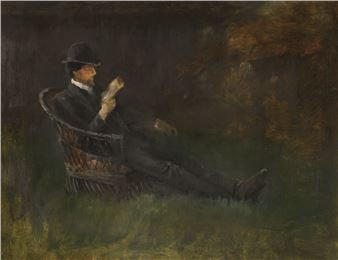Marianne Keating: No Irish Need Apply
The Model is delighted to present a new film work by the artist, Marianne Keating, entitled No Irish Need Apply, which has been commissioned by The Model especially for The Niland Collection. This single-channel film examines the realities of Irish migration to England during the twentieth century.
The Irish experience in Britain during the 1970s and 1980s was profoundly shaped by the political violence of the Troubles, and the resulting anti-Irish sentiment that was widespread within the British government and media. This period saw an entire Irish immigrant community, many of whom had settled in post-war Britain to build lives and contribute to society, targeted by restrictive legislation, denied social welfare benefits, and subjected to discrimination.
When British rule in southern Ireland ended in 1922, the lack of a robust industrial base created an unsustainable economic situation, forcing thousands of Irish citizens to seek new employment opportunities in Britain. The designation of the "special relationship" between the Republic of Ireland and the United Kingdom, allowed free movement of Irish citizens to the UK, but was in itself a remnant of the colonial era. This arrangement, while seemingly beneficial for Irish migrants, also served colonial interests. British Cabinet Papers from 1955 reveal that maintaining the flow of Irish labour was necessary to support the continued development of the UK economy.
By the late 1970s, the Irish formed the largest immigrant community in London. The escalation of the war in Northern Ireland and the IRA bombing campaign in mainland Britain led to increased tensions for the Irish community, and the Brent Irish Advisory Service (BIAS) was established in 1978, followed in 1981 by Irish in Britain Representation Group (IBRG), to support their welfare needs.
The Prevention of Terrorism Act (PTA) was rushed through British Parliament in 1974 following the Guildford and Birmingham pub bombings. This act granted sweeping powers to law enforcement, and was often used to target innocent Irish individuals. Under this legislation, Irish people were subjected to arbitrary arrests, extended detentions without charge, and exclusion from Britain without legal recourse. Such measures facilitated mass surveillance and reinforced stereotypes that cast suspicion on the entire Irish community. Everyday life became fraught with fear as Irish accents alone could provoke verbal abuse, physical assault, or even denial of service in shops and workplaces.
This systemic prejudice extended beyond public policy into social attitudes. Irish-owned businesses and homes were targeted with violence, and many people avoided Irish Centres and pubs out of fear of victimisation. The quashing of the convictions of the Guildford Four in 1990 and the Birmingham Six in 1991 finally exposed the injustices faced by the Irish in Britain, forcing a reckoning with the oppressive policies and prejudice that had silenced a vibrant community for decades. These revelations marked a turning point in reclaiming dignity and challenging anti-Irish racism.

Recommended for you
The Model is delighted to present a new film work by the artist, Marianne Keating, entitled No Irish Need Apply, which has been commissioned by The Model especially for The Niland Collection. This single-channel film examines the realities of Irish migration to England during the twentieth century.
The Irish experience in Britain during the 1970s and 1980s was profoundly shaped by the political violence of the Troubles, and the resulting anti-Irish sentiment that was widespread within the British government and media. This period saw an entire Irish immigrant community, many of whom had settled in post-war Britain to build lives and contribute to society, targeted by restrictive legislation, denied social welfare benefits, and subjected to discrimination.
When British rule in southern Ireland ended in 1922, the lack of a robust industrial base created an unsustainable economic situation, forcing thousands of Irish citizens to seek new employment opportunities in Britain. The designation of the "special relationship" between the Republic of Ireland and the United Kingdom, allowed free movement of Irish citizens to the UK, but was in itself a remnant of the colonial era. This arrangement, while seemingly beneficial for Irish migrants, also served colonial interests. British Cabinet Papers from 1955 reveal that maintaining the flow of Irish labour was necessary to support the continued development of the UK economy.
By the late 1970s, the Irish formed the largest immigrant community in London. The escalation of the war in Northern Ireland and the IRA bombing campaign in mainland Britain led to increased tensions for the Irish community, and the Brent Irish Advisory Service (BIAS) was established in 1978, followed in 1981 by Irish in Britain Representation Group (IBRG), to support their welfare needs.
The Prevention of Terrorism Act (PTA) was rushed through British Parliament in 1974 following the Guildford and Birmingham pub bombings. This act granted sweeping powers to law enforcement, and was often used to target innocent Irish individuals. Under this legislation, Irish people were subjected to arbitrary arrests, extended detentions without charge, and exclusion from Britain without legal recourse. Such measures facilitated mass surveillance and reinforced stereotypes that cast suspicion on the entire Irish community. Everyday life became fraught with fear as Irish accents alone could provoke verbal abuse, physical assault, or even denial of service in shops and workplaces.
This systemic prejudice extended beyond public policy into social attitudes. Irish-owned businesses and homes were targeted with violence, and many people avoided Irish Centres and pubs out of fear of victimisation. The quashing of the convictions of the Guildford Four in 1990 and the Birmingham Six in 1991 finally exposed the injustices faced by the Irish in Britain, forcing a reckoning with the oppressive policies and prejudice that had silenced a vibrant community for decades. These revelations marked a turning point in reclaiming dignity and challenging anti-Irish racism.















